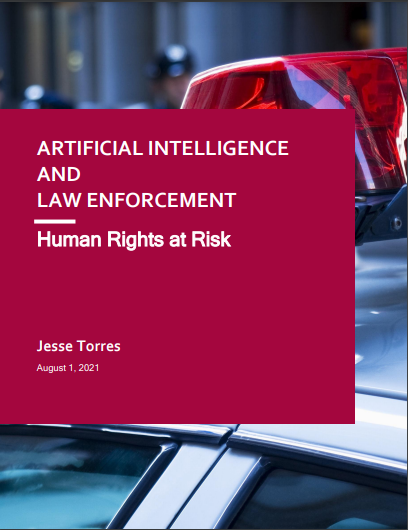Whitepaper Cautions Law Enforcement Regarding Artificial Intelligence Risks

Manhattan Beach, CA, August 10, 2021 --(PR.com)-- Tech influencer Jesse Torres has released a whitepaper that cautions law enforcement agencies regarding the risks of using artificial intelligence. The whitepaper entitled, “Artificial Intelligence and Law Enforcement: Human Rights at Risk,” details the human rights challenges that law enforcement agencies face when deploying artificial intelligence solutions.
The whitepaper describes three key areas in which law enforcement currently uses artificial intelligence: place-based predictive policing, facial recognition, and judicial decision-making.
Torres writes, “Thanks to advances in computing, a significant drop in the cost of computing resources, the availability of an endless data stream, and the ability to readily analyze the data, the AI industry has managed to make artificial intelligence the topic of conversations in every corner of society and within practically every industry imaginable. AI is on its way to becoming a ubiquitous technology.”
Torres urges law enforcement personnel responsible for implementing and maintaining AI solutions to carefully consider the impact that the technology will have upon the populations upon which it is used. “Careful consideration must be given to ensure that the users of AI fully understand what the technology can and cannot do. Members of law enforcement need to recognize that AI is not a panacea for effective policing but merely another tool to assist in carrying out their missions.”
Artificial Intelligence and Law Enforcement: Human Rights at Risk can be downloaded at https://bit.ly/ailerisks.
Jesse Torres has spent the past three decades working as an ethics and compliance professional. He is a graduate of UCLA, a former bank examiner with the U.S. Treasury, and previously served as a senior consultant for KPMG. Jesse is a frequent conference speaker and is active on Twitter (@jstorres) with over 400,000 followers.
The whitepaper describes three key areas in which law enforcement currently uses artificial intelligence: place-based predictive policing, facial recognition, and judicial decision-making.
Torres writes, “Thanks to advances in computing, a significant drop in the cost of computing resources, the availability of an endless data stream, and the ability to readily analyze the data, the AI industry has managed to make artificial intelligence the topic of conversations in every corner of society and within practically every industry imaginable. AI is on its way to becoming a ubiquitous technology.”
Torres urges law enforcement personnel responsible for implementing and maintaining AI solutions to carefully consider the impact that the technology will have upon the populations upon which it is used. “Careful consideration must be given to ensure that the users of AI fully understand what the technology can and cannot do. Members of law enforcement need to recognize that AI is not a panacea for effective policing but merely another tool to assist in carrying out their missions.”
Artificial Intelligence and Law Enforcement: Human Rights at Risk can be downloaded at https://bit.ly/ailerisks.
Jesse Torres has spent the past three decades working as an ethics and compliance professional. He is a graduate of UCLA, a former bank examiner with the U.S. Treasury, and previously served as a senior consultant for KPMG. Jesse is a frequent conference speaker and is active on Twitter (@jstorres) with over 400,000 followers.
Contact
Jesse Torres
310-650-3681
310-650-3681
Categories
